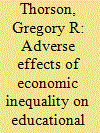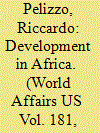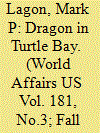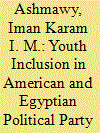| Srl | Item |
| 1 |
ID:
163921


|
|
|
|
|
| Summary/Abstract |
One of the most important economic trends of the past 30 years has been the escalating levels of within-country income inequality. Much of the developed world is currently experiencing large increases in income inequality. Indeed, income inequality in the United States now exceeds the previous highs of the 1930s. Recent research has found that increases in income inequality can produce a wide variety of societal ills. This article examines the effects of economic inequality on educational outcomes. Drawing on data provided by the World Bank and the Organisation for Economic Co-operation and Development (OECD) from 2000 through 2015, we find that a country’s level of economic inequality has large, negative effects on its student academic achievement. The effect sizes are largest in math. We examine a variety of potential solutions to lessen within-country economic inequality.
|
|
|
|
|
|
|
|
|
|
|
|
|
|
|
|
| 2 |
ID:
163920


|
|
|
|
|
| Summary/Abstract |
The purpose of this article is to analyze Africa’s progress along the developmental path in the past few decades, to understand what factors were responsible for such success and to identify the risk factors that may compromise further development in the region in the years to come. We advance three basic claims: that Africa has experienced an almost unprecedented (by its standards) level of economic success in the first 15 years of the new millennium, that this success was made possible by a combination of domestic and supranational conditions, and that some of the enabling conditions that supported Africa’s growth and development in the new millennium may be disappearing. The study also suggests that while African countries may not be able to influence the global conditions on which their economic success depends, they do have the ability to influence the domestic conditions. This is why, we suggest, in addition to ensuring longer and healthier lives for their citizens, African countries should consolidate democracy and promote good governance.
|
|
|
|
|
|
|
|
|
|
|
|
|
|
|
|
| 3 |
ID:
163919


|
|
|
|
|
| Summary/Abstract |
China’s role in the United Nations (UN) is steadily rising at a time the United States is seeking burden-sharing and rethinking its multilateral leadership role. This article highlights that China’s increasing role in three critical areas—(1) UN peacekeeping; (2) the work of the UN on human rights, particularly in the Human Rights Council; and (3) the governance of the digital realm and Internet freedom—has significant implications for U.S. interests and broader global governance efforts. Although China’s transformation into a responsible stakeholder in various areas of the UN’s work could be promising, Beijing’s attempts to alter existing liberal norms bear close examination. Those seeking a larger Chinese role in the UN might best be careful what they wish for. Despite the emergence of populism and some skepticism of multilateral arrangements in their domestic politics, the United States and like-minded nations have an interest in reinforcing liberal norms in these three areas of global governance and beyond.
|
|
|
|
|
|
|
|
|
|
|
|
|
|
|
|
| 4 |
ID:
163918


|
|
|
|
|
| Summary/Abstract |
The Arab Spring revealed that when the youth are marginalized, they can resort to informal political movements that may be characterized by extremism and criminality. However, when they join formal groupings, such as political parties, and are well utilized within them, they can become an active political force. This article explores the extent to which American and Egyptian political parties offer opportunities for youth inclusion in their structure and decision-making processes. By conducting semi-structured interviews with young members of the largest two Egyptian parties and the Democratic and Republican parties in the United States, the study argues that when young people develop a long-term interest in politics, they join political parties. Moreover, they are included in the party structures and decision-making processes when they are included in party activities and positions, as well as trusted, heard, and supported within the party. The existence of a national plan and political will may even encourage cross-party youth collaboration.
|
|
|
|
|
|
|
|
|
|
|
|
|
|
|
|